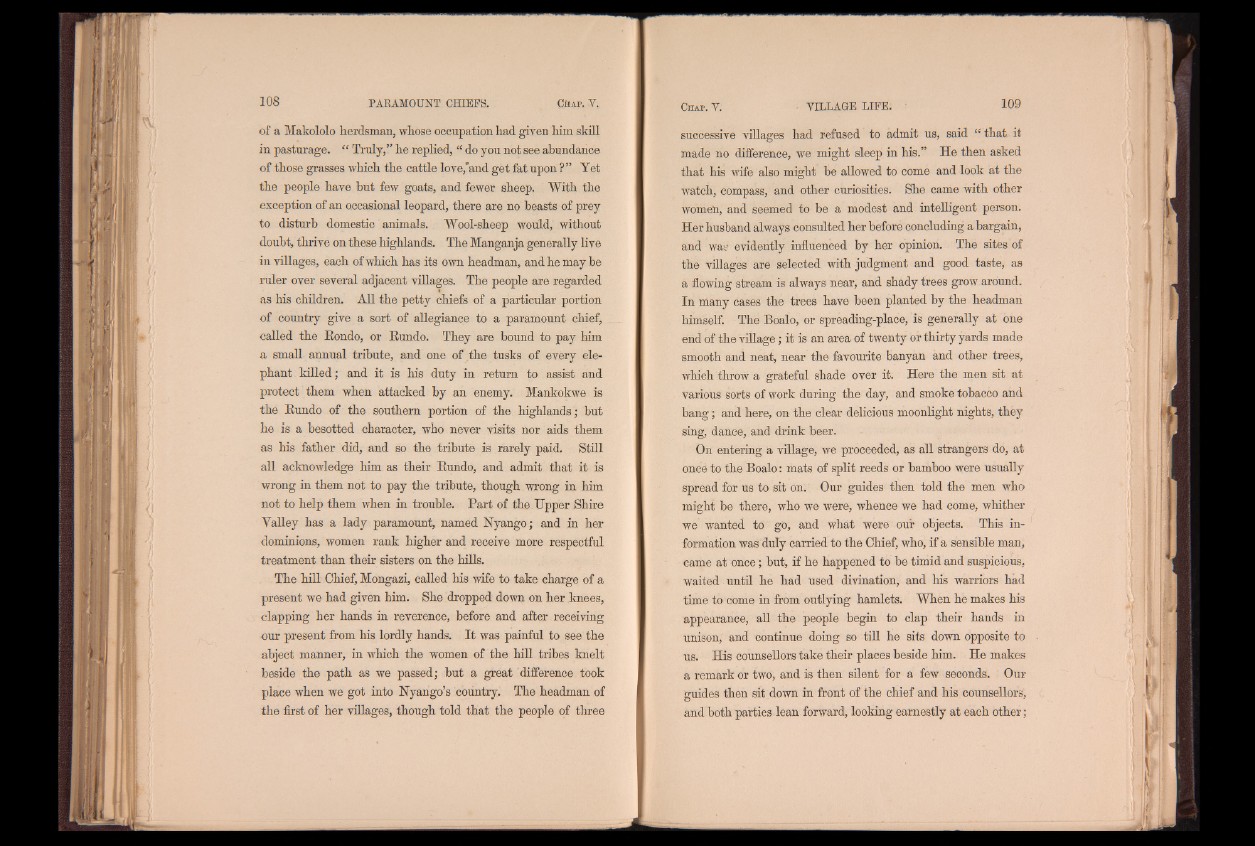
of a Makololo herdsman, whose occupation had given him skill
in pasturage. “ Truly,” he replied, “ do you not see abundance
of those grasses which the cattle love,'and get fat upon ? ” Yet
the people have but few goats, and fewer sheep. With the
exception of an occasional leopard, there are no beasts of prey
to disturb domestic animals. Wool-sheep would, without
doubt, thrive on these highlands. The Manganja generally live
in villages, each of which has its own headman, and he may he
ruler over several adjacent villages. The people are regarded
as his children. All the petty chiefs of a particular portion
of country give a sort of allegiance to a paramount chief,
called the Bondo, or Bundo. They are bound to pay him
a small annual tribute, and one of the tusks of every elephant
killed; and it is his duty in return to assist and
protect them when attacked by an enemy. Mankokwe is
the Eundo of the southern portion of the highlands ; but
he is a besotted character, who never visits nor aids them
as his father did, and so the tribute is rarely paid. Still
all acknowledge him as their Eundo, and admit that it is
wrong in them not to pay the tribute, though wrong in him
not to help them when in trouble. Part of the Tipper Shire
Talley has a lady paramount, named Nyango; and in her
dominions, women rank higher and receive more respectful
treatment than their sisters on the hills.
The hill Chief, Mongazi, called his wife to take charge of a
present we had given him. She dropped down on her knees,
clapping her hands in reverence, before and after receiving
our present from his lordly hands. I t was painful to see the
abject manner, in which the women of the hill tribes knelt
beside the path as we passed; but a great difference took
place when we got into Nyango’s country. The headman of
the first of her villages, though told that the people of three
successive villages had refused to admit us, said “ that, it
made no difference, we might sleep in his.” He then asked
that his wife also might be allowed to come and look at the
watch, compass, and other curiosities. She came with other
women, and seemed to be a modest and intelligent person.
Her husband always consulted her before concluding a bargain,
and was evidently influenced by her opinion. The sites of
the villages are selected with judgment and good taste, as
a flowing stream is always near, and shady trees grow around.
In many cases the trees have been planted by the headman
himsp.lf. The Boalo, or spreading-place, is generally at one
end of the village; it is an area of twenty or thirty yards made
smooth and neat, near the favourite banyan and other trees,
which throw a grateful shade over it. Here the men sit at
various sorts of work during the day, and smoke tobacco and
bang; and here, on the clear delicious moonlight nights, they
sing, dance, and drink beer.
On entering a village, we proceeded, as all strangers do, at
once to the Boalo: mats of split reeds or bamboo were usually
spread for us to sit on. Our guides then told the men who
might be there, who we were, whence we had come, whither
we wanted to go, and what were our objects. This information
was duly carried to the Chief, who, if a sensible man,
came at once; but, if he happened to be timid and suspicious,
Waited until he had used divination, and his warriors had
time to come in from outlying hamlets. When he makes his
appearance, all the people begin to clap their hands in
unison, and continue doing so till he sits down opposite to
us. His counsellors take their places beside him. He makes
a remark or two, and is then silent for a few seconds. Our
guides then sit down in front of the chief and his counsellors, D P
and both parties lean forward, looking earnestly at each other;